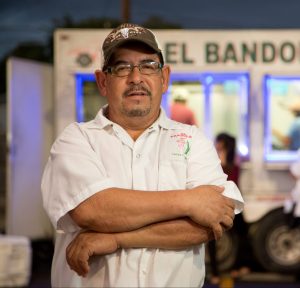Allow businesses to operate where they need to and meet customers where they are at
COVID-19 has forced the closure of many brick-and-mortar establishments and makes the prospect of working in or seeking services at a densely packed indoor space unappealing. The cost of retrofitting a space to accommodate for social distancing may be out of reach or paying high rent for a dwindling customer base may be too high. States should do everything they can to maximize opportunities to continue business or start new ventures independent of a brick-and-mortar establishment.

Mobile vending and mobile services
Mobile vending allows entrepreneurs and customers to avoid concerns surrounding indoor brick-and-mortar environments. Products and services can be brought directly to consumers, patrons queue outside, and if a service is provided inside a truck, only one or two people are in close contact, as opposed to dozens inside a traditional store.
Food trucks have demonstrated the viability of the model: they are wildly popular in cities that embrace them. In the best of times, food trucks provide an affordable and accessible path towards entrepreneurship, enrich the communities in which they operate, and help keep the streets safe. Food trucks can also serve food deserts that have been hit hardest by restaurant and store closures, and have helped keep the truck drivers who are responsible for ensuring the health of our nation’s food supply chains fed by operating at rest stops.
Similarly, beyond the food industry, entrepreneurs struggling at brick-and-mortar operations can take their products, skills, and services to the streets. Mobile services are becoming increasingly common, including mobile pet grooming, clothing stores, hair styling, and other services.
Unfortunately, many mobile vendors and service providers struggle to operate under confusing and burdensome state and local regulations. And moving from city to city can be a nightmare, as restrictions and regulations widely vary. These laws need to be reformed and streamlined. A statewide process that allows mobile vendors to operate in all jurisdictions in the state, creates uniform operating standards, and simplifies inspections will open significant opportunities, while inherently respecting concerns about the indoor spread of COVID-19.
IJ can help lawmakers adapt our Mobile Food Vendor Freedom Act to your state or streamline and simplify the licensing process for mobile vendors or service providers.
Home-based businesses
A huge swath of the American workforce is now working from home. The percentage of Americans who commute to an office may never return to pre-COVID levels, and sky-high commercial rent now looks untenable for many businesses. Home-based businesses are an obvious option for those services that can be provided from the home. And anyone who has taken a piano lesson in their teacher’s house or sent their child to daycare in a neighbor’s home has been a client in a home-based business.
But today, too many municipal home occupation ordinances impose archaic restrictions—that predate computers and the internet—on client visits, interior design, and other in-home matters that are none of the government’s business. Zoning ordinances should regulate neighborhood effects, not private conduct. IJ’s Model Home-Based Business and Occupation Act brings home occupation ordinances into the twenty-first century by modifying the zoning enabling act at the state level. The model makes minimal changes to zoning law while clarifying that home occupations, so long as they do not disturb the neighborhood, are presumptively legal.
Get Started Today.
Please fill out this form and an IJ staff member will reach out to you shortly.